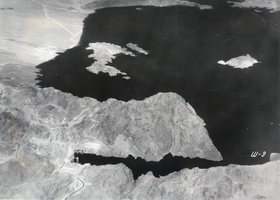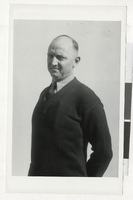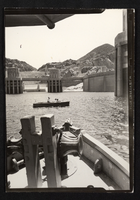Search the Special Collections and Archives Portal
Search Results

Photograph of Lake Mead, Nevada, circa 1937-1938
Date
Archival Collection
Description
Image

Photograph of Frank T. Crowe, 1930s
Date
Archival Collection
Description
Photograph of Frank T. Crowe, the Construction Superintendent for Six Companies on the Hoover Dam, 1930s.
Image
Dorothy and Altus E. "Tex" Nunley oral history interview
Identifier
Abstract
Oral history interview with Dorothy and Altus E. "Tex" Nunley by Dennis McBride on June 9, 1986 for the Boulder City Library Oral History Project. The interview starts with Tex, who relates how he arrived in Nevada in 1931 as a government "rod man", employed to assist the engineers planning the infrastructure for the construction of Hoover Dam. He discusses the early tent city called "McKeeversville" named after the mess hall cook who pitched the first tent in the area, and the process of building railroad tracks from the Union Pacific spur that ended in what would soon become Boulder City. After this, both speak at length about the details of the dam's construction, Tex's work as a high rigger, the development of Boulder City, and many anecdotes about individuals associated with bost the city and the dam.
Archival Collection
Evelyn Miller McDonald oral history interview
Identifier
Abstract
Oral history interview with Evelyn Miller McDonald conducted by Maylene C. Cabatingan on February 26, 1980 and February 27, 1980 for the Ralph Roske Oral History Project on Early Las Vegas. McDonald discusses her occupational history and how her father started the first car garage in Las Vegas, Nevada. She talks about the Great Depression, Boulder (Hoover) Dam, and the appeal that Las Vegas, Nevada had to tourists and divorcees. McDonald later discusses how prostitution was accepted by the Las Vegas, Nevada community.
Archival Collection
Therese Thomas oral history interview
Identifier
Abstract
Oral history interview with Therese Thomas conducted by Dennis McBride on March 13, 1995 for the Boulder City Library Oral History Project. In the interview, Thomas discusses her early life in Thistle, Utah before moving to Las Vegas, Nevada in approximately 1931, where her father worked on the Hoover Dam (Boulder Dam) construction. Thomas then talks about her early schooling in Boulder City, Nevada, her experiences as a swing and dance band musician, Block 16 in the Clark Las Vegas Townsite, and her memories of Las Vegas hotels and casinos. Other subjects Thomas covers include Las Vegas entertainers, entertainment venues, and women in the music industry during the 1930s.
Archival Collection
Helen Manix oral history interviews
Identifier
Abstract
Oral history interviews with Helen Manix conducted by Art Rader on October 29, 1974 and November 01, 1974 for the Ralph Roske Oral History Project on Early Las Vegas. In the interviews, Helen Manix discusses moving to Boulder City, Nevada in 1939 with her husband, John Manix, to operate a general merchandise store. Helen Manix and her son, Joseph "Joe" Manix, Jr., also discuss their local community, Boulder (Hoover) Dam, and their experiences in Boulder City during World War II.
Archival Collection
Tommy Nelson oral history interview
Identifier
Abstract
Oral history interview with Tommy Nelson conducted by Art Rader on November 29, 1974 for the Ralph Roske Oral History Project on Early Las Vegas. In this interview, Nelson discusses the history of Boulder City, Nevada and his career as a musician. He describes moving to Boulder City in 1932 and working as a laborer on the construction of Hoover Dam (Boulder Dam). Nelson describes life in the city during the construction of the dam, how the dam was built, and how Boulder City has changed. Nelson continues, talking about being a trumpeter, performing in various orchestras in Las Vegas, Nevada casino shows, and for injured United States service members during World War II.
Archival Collection

Photograph of a boat, Lake Mead, circa 1935-1950
Date
Archival Collection
Description
Image
Chet Carrigan oral history interview
Identifier
Abstract
Oral history interview with Chet Carrigan conducted by Robert Kahre on February 17, 1981 for the Ralph Roske Oral History Project on Early Las Vegas. Carrigan first talks about his background in construction as well as some of his experiences in the Sheriff’s Posse before describing the major events and changes of Las Vegas, Nevada that he witnessed. Carrigan also talks about his family, the effects of the Great Depression on the city, the flooding problem, and the building of Hoover Dam. He also describes the first schools in Las Vegas, means of transportation, his laundry business, his experience on the volunteer fire department, the first movie theaters, and Cashman Field.
Archival Collection
F. Lorin Ronnow oral history interview
Identifier
Abstract
Oral history interview with F. Lorin Ronnow conducted by Mindy Braver on March 11, 1981 for the Ralph Roske Oral History Project on Early Las Vegas. In this interview, Ronnow discusses his personal history in Las Vegas, Nevada after being hired by the Union Pacific Railroad to play for their baseball team in 1928. Ronnow discusses being a hoisting engineer during the construction of the Hoover Dam, the economic benefit of the dam during the Great Depression, and his own business ventures in Las Vegas. Ronnow describes his career in banking, how Las Vegas has changed, and prominent celebrities coming to Nevada to divorce. Ronnow also discusses occupational discrimination against African Americans and women.
Archival Collection
